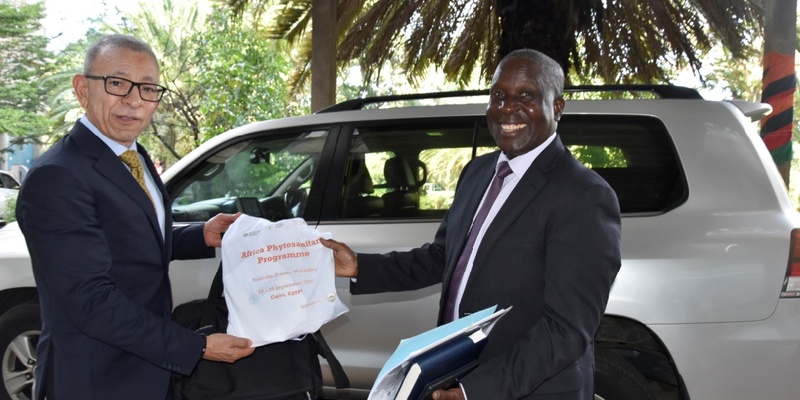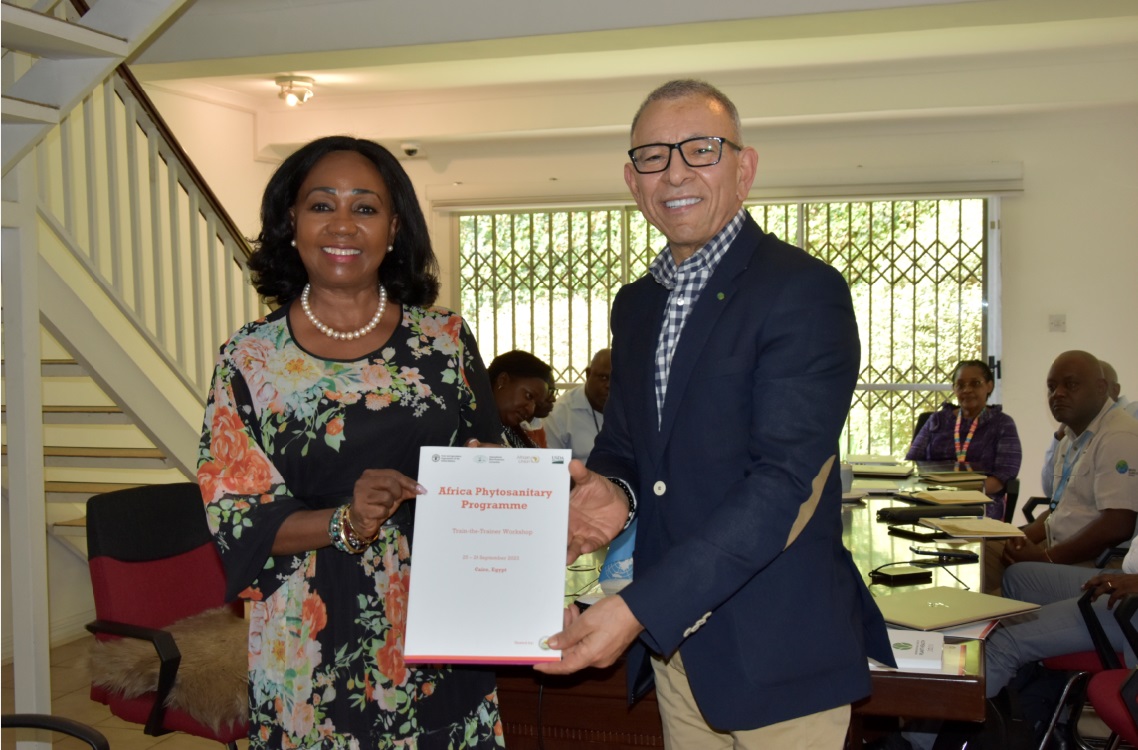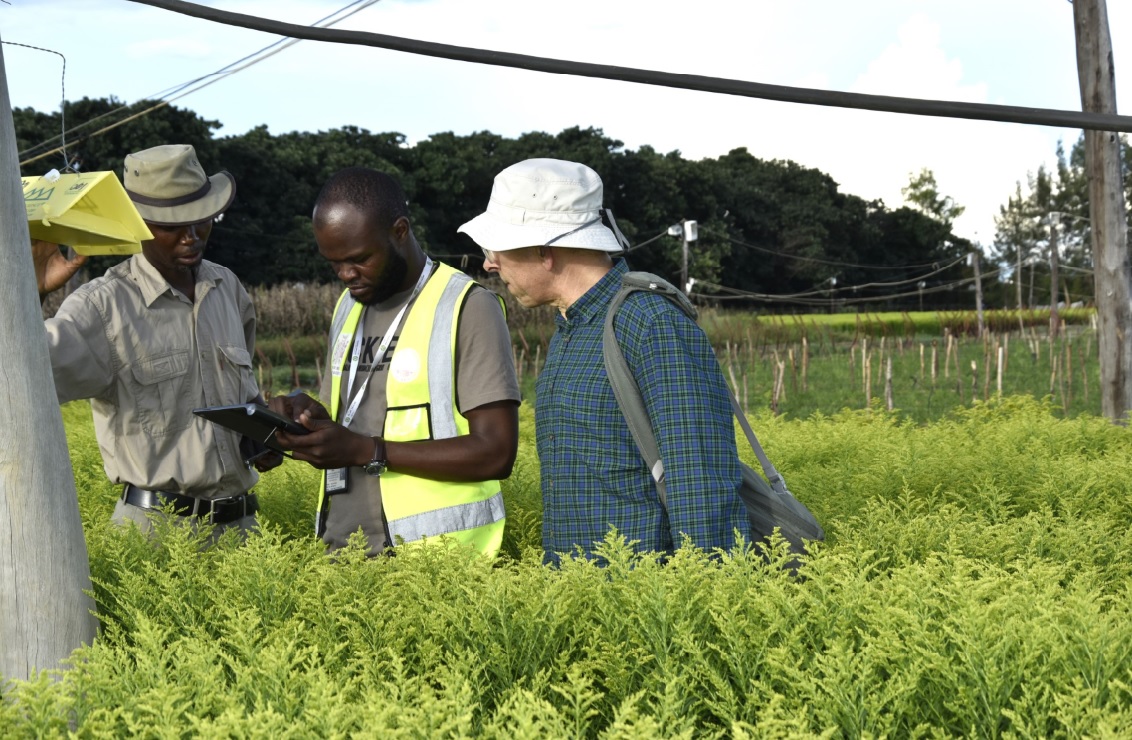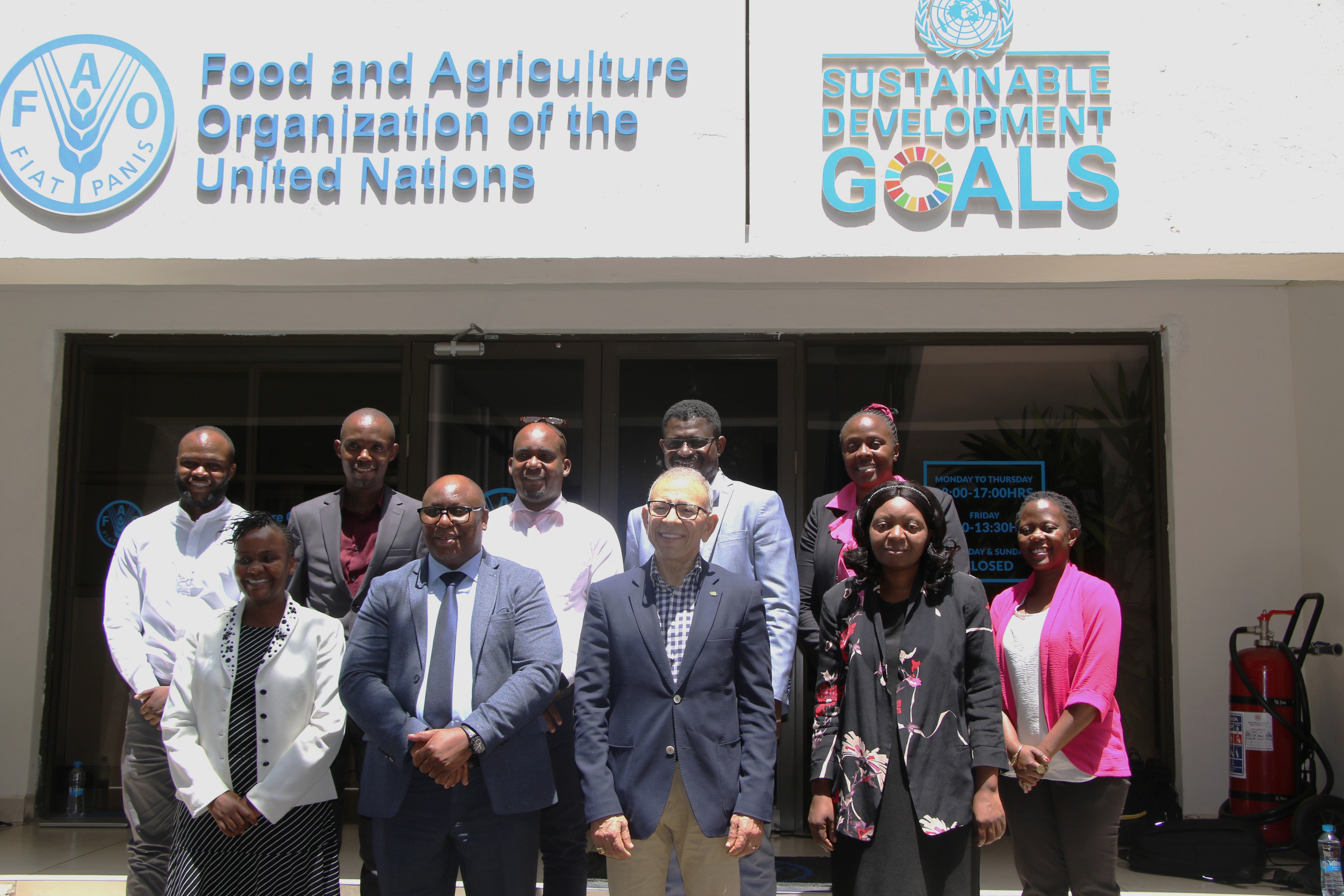SPOTLIGHT: Zambia, steadfast champion for plant health and the Africa Phytosanitary Programme
Posted on Tue, 14 May 2024, 13:04

Osama El-Lissy- IPPC Secretary (left) hands over information materials on the IPPC and APP to Honourable Reuben R. Phiri Mtolo (right), Minister of Agriculture of Zambia © FAO/ Anita Tibasaaga
With plant pests and diseases becoming more severe, causing significant crop production and economic losses worldwide, impacting food security and affecting safe trade, the role of national plant protection organizations (NPPOs) as competent national authorities and vanguards of plant protection cannot be overemphasized. NPPOs are national agencies that undertake operations to implement the International Plant Protection Convention (IPPC), specially to protect plant resources from pests and foster international cooperation to prevent the introduction and spread of plant pests.
Through the Africa Phytosanitary Programme (APP), the IPPC is collaborating with the Food and Agriculture Organization of the United Nations (FAO), the African Union Commission on Agriculture, and the United States Department of Agriculture (USDA), to empower NPPOs in 11 APP pilot countries in Africa, including Zambia, to use advanced scientific approaches for proactive pest surveillance and data collection. The APP tools are aimed at helping countries to conduct early detection and timely response to pests that affect food security, trade in crops and plant products, as well as environment.
During a mission to African countries involved in APP, in March 2024, IPPC Secretary Osama El-Lissy commended Zambia for prioritizing plant protection and capacity development of phytosanitary staff of the Zambia NPPO, the Plant Quarantine and Phytosanitary Service (PQPS).
“The IPPC Secretariat is excited about APP because we’re taking a very scientific approach to pest monitoring and management by providing scientific knowledge and technology in the form of computer tablets,” he said. “APP will elevate the technical capacity of NPPO personnel to tackle pests such as False codling moth (Thaumatotibia leucotreta) and diseases such as cassava brown streak disease, which affect food and income security crops in Zambia,” he added.
Honourable Reuben R. Phiri Mtolo, Minister of Agriculture of Zambia, thanked the IPPC for coordinating APP and pledged the Ministry’s support towards the programme’s success. He commended the NPPO for championing plant health and stressed the importance of plant protection to safeguard food security.
Protecting plant health in emergencies
The IPPC mission took place within a fortnight of Zambia announcing a national disaster and emergency, caused by prolonged drought and harsh weather conditions, attributed in part to climate change. According to national and international news reports, the drought had destroyed nearly half of all the area planted with the staple maize crop, was devastating food production, and threatening food security and incomes for more than one million farming households.
El-Lissy empathized with the people of Zambia, noting that the drought would likely lower the immunity of plants to pests and diseases, giving pests the perfect opportunity to intensify and cause massive damage.
“Climate change is a real concern. We are optimistic that APP can transform the way plant pests are being managed in Africa by supporting countries to collect real-time data to help them make informed decisions on pest protection, before such emergencies occur,” he said.
He called for more strategic level discussions with national and international leaders, to strengthen collaboration in protecting agriculture and trade from pests.
Secretary El-Lissy also met Anne-Rose Suze Percy Filippini, FAO Representative in Zambia.
“I am so happy that Zambia is one of the countries selected to be in APP. FAO Zambia is ready to identify and strengthen synergies with the IPPC, to effectively implement APP and ensure its positive contribution to plant health in Zambia,” she said.

Anne-Rose Suze Percy Filippini, FAO Representative in Zambia receives a folder with information on APP, from Osama El-Lissy, IPPC Secretary © FAO/ Anita Tibasaaga
Zambia NPPO up to the task
Kenneth Msiska, Director of the PQPS or NPPO of Zambia, thanked the IPPC plant health community for choosing Zambia as an APP pilot country.
He thanked the Ministry of Agriculture for its leadership and foresight, through which the NPPO was elevated from a unit in the country’s agriculture research institute, to a fully-fledged department.
“We have a capable and focused team committed to improving plant health in Zambia, for safe domestic and international trade,” Msiska said.
 El-Lissy (right) joins staff of NPPO of Zambia to use APP software for pest surveillance at farm in Lusaka, Zambia © FAO/ Anita Tibasaaga |  Osama El-Lissy (front row, center), Kenneth Msiska (front row, second left) with staff of PQPS and the IPPC Secretariat © FAO/ Emmanuel Kabila |
Msiska noted that Secretary El-Lissy’s visit would emphasize the role of the NPPO as “chief advisor of the government in terms of phytosanitary matters”, especially as the drought in Zambia would likely force the country to import grain. “It is important to consider the introduction and spread of pests in importation and trade during emergency situations”, he added.
In 2020, Zambia championed a resolution at the 27th session of the FAO Committee on Agriculture on the yearly observance of the International Day of Plant Health on 12 May. The proposal was endorsed at the 76th Session of the United Nations General Assembly in 2021 and the first International Day of Plant Health was held on 12 May 2022.
To strengthen its plant health infrastructure, Zambia conducted a Phytosanitary Capacity Evaluation (PCE) in 2023. The IPPC Secretariat also trained two of the NPPO staff as PCE facilitators. Msiska said that this had made the NPPO more visible at the national and regional levels. “We hope to sustain that momentum,” he said.
Related information:

